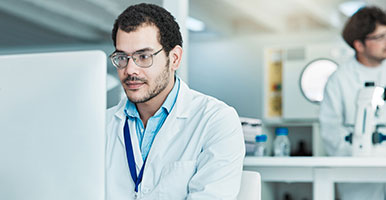
Yesterday, I (Laura Haldane) had a great chat with Adam Smartschan and David Nathan on using ChatGPT and other AI tools for selling to scientists. Afterwards I decided to try it out myself so on my phone I asked ChatGPT to create a blog. Here's the prompt I gave it:
Write me a blog summarising the key takeaways of a webinar with Adam Smartschan, David Nathan and Laura Haldane.
Include the following points:
- ChatGPT can only get you so far, it will never be original content and it may have inaccuracies. But it is incredibly quick to start off a blog or email using it and you only need to then tweak the content.
- AI isn't great at scientific content but a new bioGPT has just been launched which is trained on pubmed which should help.
- By nature AI cannot talk about new concepts as there isn't enough content out there already for it to learn.
- mid journey is very cool for creating graphics but its major drawback is you don't get the original source image. So you can't then make edits to the layers like changing colours. However it's a fantastic way to start generating ideas. Especially if you aren't a designer and want to give an idea of what they should create.
- we are OK to use these for commercial use but we need to make sure we haven't accidentally created something too similar to copyrighted content
- this now isn't just for young nerd this is now for everyone. Anyone can and should be using these in their tool kits.
I also asked MidJourney to create a photo of "An image of an Irish girl and two American men on Zoom". We've never looked better.

Here's the ChatGPT summary of yesterday's webinar:
Recently, I attended a webinar featuring Adam Smartschan, David Nathan, and Laura Haldane. The discussion was primarily about AI tools and how they can help us in our work. Here are the key takeaways from the webinar.
Firstly, ChatGPT can only take you so far. Although it is quick to start off a blog or email using it, the content it produces is not original, and there may be inaccuracies. It's important to remember that AI tools are not perfect, and we should use them as a starting point to produce high-quality content.
Secondly, AI isn't great at scientific content, but there's a new tool called bioGPT that has been launched, which is trained on pubmed, and should help us in producing more accurate scientific content.
Thirdly, by nature, AI cannot talk about new concepts as there isn't enough content out there already for it to learn. It's important to keep this in mind when using AI tools, as they may not be suitable for generating new ideas or concepts.
Mid-Journey is an AI tool that is very cool for creating graphics. It's a fantastic way to start generating ideas, especially if you aren't a designer and want to give an idea of what they should create. However, its major drawback is that you don't get the original source image, so you can't then make edits to the layers like changing colors.
It's OK to use these AI tools for commercial use, but we need to make sure that we haven't accidentally created something too similar to copyrighted content.
Lastly, these AI tools are now not just for young nerds; they are now for everyone. Anyone can and should be using these in their toolkits to help them in their work.
In conclusion, AI tools are a fantastic resource to help us in our work, but we need to remember their limitations and use them as a starting point to produce high-quality content. We should also be aware of copyright laws and use these tools responsibly. As AI technology continues to develop, we can expect to see more exciting tools that will help us in our work.
I mean. It's basically what I prompted it with, but I did that super quickly on my phone as I have ChatGPT on Whatsapp. It definitely would have taken me longer to do this blog if it didn't spit that out.
We promised links on how to get started:
Chat GPT: https://openai.com/blog/chatgpt/ (Remember it is often down during US working hours so best to try outside of those. Though it worked fine for me there at 10am ET)
To watch the entire webinar to go: https://samps.org/webinar-series/




